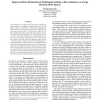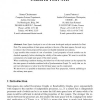130
Voted
APN
2008
Springer
15 years 4 months ago
2008
Springer
Model checking is a powerful and widespread technique for the verification of finite distributed systems. However, the main hindrance for wider application of this technique is the...
103
Voted
AIPS
2008
15 years 5 months ago
2008
The heuristics used for planning and search often take the pattern databases generated from abstracted versions of the given state space. Pattern databases are typically stored p ...
137
Voted
AAAI
2008
15 years 5 months ago
2008
Agents often have to construct plans that obey resource limits for continuous resources whose consumption can only be characterized by probability distributions. While Markov Deci...
119
Voted
AAAI
2008
15 years 5 months ago
2008
Particle filtering algorithms can be used for the monitoring of dynamic systems with continuous state variables and without any constraints on the form of the probability distribu...
137
Voted
AAAI
2008
15 years 5 months ago
2008
In order to interact successfully in social situations, a robot must be able to observe others' actions and base its own behavior on its beliefs about their intentions. Many ...
109
Voted
AAAI
2007
15 years 5 months ago
2007
State estimation in multiagent settings involves updating an agent’s belief over the physical states and the space of other agents’ models. Performance of the previous approac...
122
Voted
ASM
2010
ASM
15 years 6 months ago
2010
ASM
Symmetry reduction is a model checking technique that can help alleviate the problem of state space explosion, by preventing redundant state space exploration. In previous work, we...
127
Voted
APN
1995
Springer
15 years 6 months ago
1995
Springer
State Space Analysis is one of the most developed analysis methods for Petri Nets. The main problem of state space analysis is the size of the state spaces. Several ways to reduce ...
110
Voted
MICAI
2000
Springer
15 years 6 months ago
2000
Springer
Unique Fixpoint Induction, UFI, is a chief inference rule to prove the equivalence of recursive processes in CCS [7]. It plays a major role in the equational approach to verificati...
134
Voted
ICTAI
2000
IEEE
15 years 6 months ago
2000
IEEE
Markov Decision Processes (MDP) have been widely used as a framework for planning under uncertainty. They allow to compute optimal sequences of actions in order to achieve a given...


